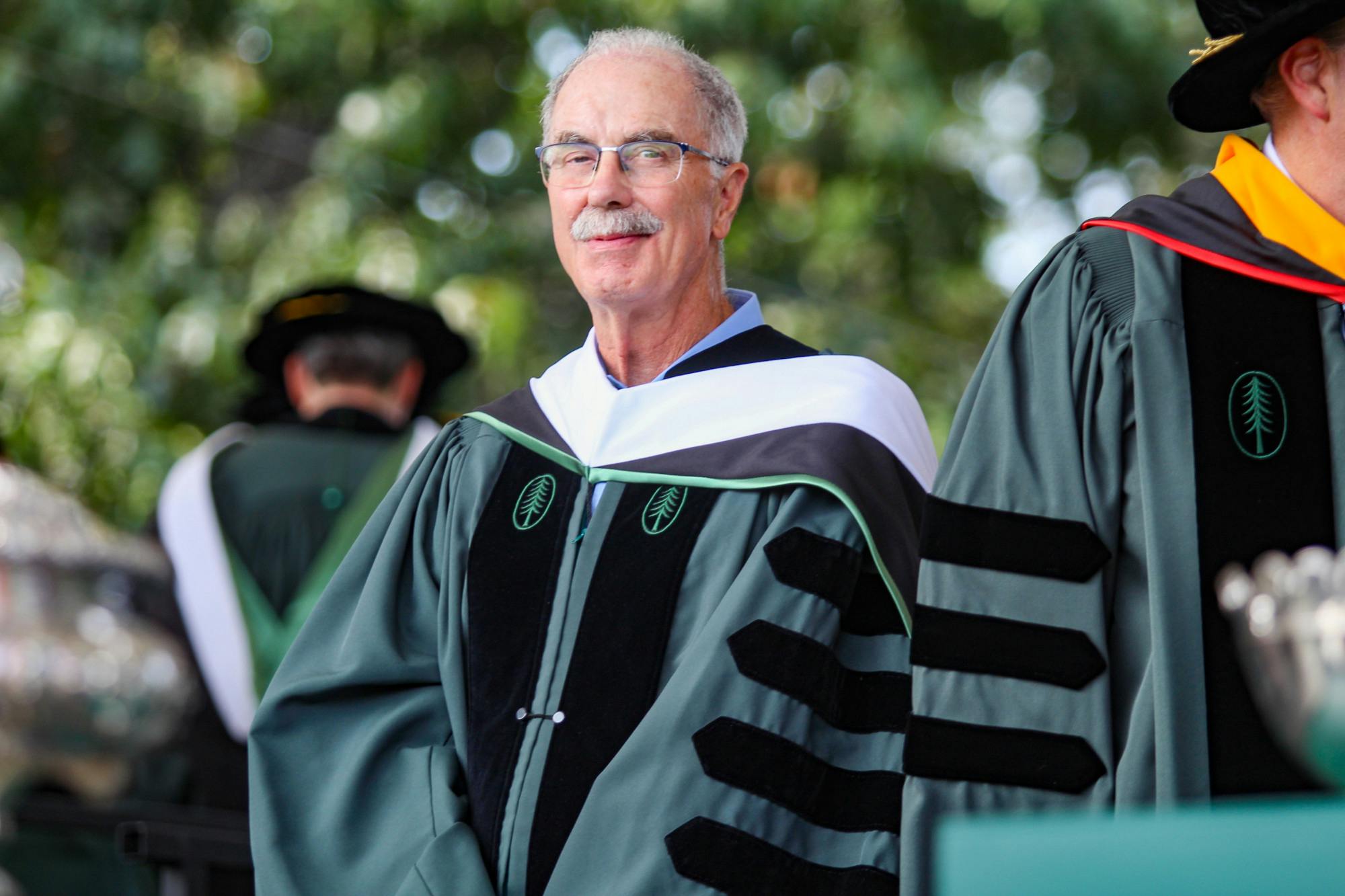In the fall of 1973, when Phillip J. Hanlon ’77 arrived in Hanover from his hometown of Gouverneur, New York for his first year as a Dartmouth student, he enrolled in English 5 with English professor Donald Pease. In the decades since, Hanlon’s struggles in that course have become a recurrent story in his speeches and throughout his 10 years as president of the College. The lesson highlights how Hanlon was able to overcome self-doubt and become a “transformative” leader, Pease said.
Hanlon — who stepped down this past June — was named Dartmouth’s 18th president in 2012, succeeding Jim Yong Kim on June 10, 2013 and becoming the 10th alumnus to serve as president of the College.
Prior to his tenure as president, Hanlon spent 20 years as a faculty member at the University of Michigan, where he also held administrative positions including provost and executive vice president for academic affairs. Pease, who has taught at Dartmouth for 50 years under seven presidents, said that any time a staff member from a different university becomes president, some faculty worry they may want to remake the institution.
“Some faculty worried that Dartmouth’s image would be remade in Michigan’s image, moving away from the collegial model,” Pease said.
Those worries dissipated in Hanlon’s first staff address as president, in which he indicated that he “admired the reputation of Dartmouth faculty” as both teachers and scholars who wanted to bring students into their work, Pease said.
“It became quickly clear that he was really focused on academic excellence: strengthening the faculty, strengthening the student body and building our capacity to be excellent in many ways,” College Provost David Kotz ’86 said.
During his tenure, Hanlon increased the number of faculty in Arts and Sciences from 579 in 2012 to 640 in 2022, according to the Dartmouth Fact Book. Hanlon created the academic cluster initiative in 2014, which has established 30 new faculty positions across 10 different interdisciplinary cohorts.
In 2016, Hanlon oversaw the creation of the Frank J. Guarini School of Graduate and Advanced Studies — which was named in honor of Frank J. Guarini in 2018 and offers a variety of master’s and doctoral degrees — the first college to be created at Dartmouth in over a century. Now housed within the umbrella of Guarini, Hanlon introduced the Society of Fellows, a postdoctoral fellowship program, in 2014. Pease said the program is a three-year postdoctoral fellowship housed within a range of departments within the College.
“Students saw [post-doctoral fellows] as faculty with whom they could enter into engaged relationships,” he said. “It continues to provide a bridge between undergraduate and graduate students.”
During his tenure, Hanlon also addressed social life at Dartmouth, which Pease called “perhaps the most difficult of issues” afflicting the College. At the start of Hanlon’s tenure, the College faced a national spotlight for high-risk drinking and other destructive behavior on campus. In response, Hanlon announced the Moving Dartmouth Forward initiative in 2015, which led to the housing community system, a ban on hard alcohol and a new sexual assault policy.
On social reform on campus, Hanlon turned a scandal into an opportunity, Pease said.
“One of the strategies President Hanlon used in his distinguished tenure was to turn isolated incidents into precepts for institutional and structural change,” Pease said. “He used what could have been a debilitating event as the justification for a policy that could work against such behavior.”
Hanlon’s presidency oversaw the Call to Lead campaign, an education and leadership initiative which has raised upwards of $3.77 billion from more than 100,000 donors — including over 60% of alumni. In 2022, the campaign allowed the College to extend eligibility for financial aid by eliminating loans and extending its need-blind admissions policy to all students. Dartmouth’s need-blind policies are one of seven such university programs in the country.
The campaign also spurred construction and renovation of buildings across campus. Hanlon’s tenure saw the expansion of the West End of campus — with the opening of both the Irving Institute for Energy and Society and the Class of 1982 Center for Engineering and Computer Science — as well as the renovation of Dartmouth Hall and the Hopkins Center for the Arts, among others.
“Some really amazing spaces were created on campus, in terms of high quality, high efficiency and academic effectiveness,” Kotz said.
Hanlon oversaw the College throughout the entirety of the COVID-19 pandemic. The College’s pandemic response — which resulted in an unprecedented number of students taking classes virtually and off-campus, as well as economic losses for the College — created friction between the administration and students. Over the course of the pandemic, the administration moved students towards and away from online learning while facing complaints of students feeling isolated.
At the height of the pandemic, the deaths of three members of the Class of 2024 triggered student outrage about the College’s mental health policies. In response, the administration spearheaded reform to increased its resources, including a partnership with the JED Foundation, a nonprofit focused on mental health and suicide prevention.
In an interview with The Dartmouth in June, Hanlon said that the loss of community members was the greatest challenge he faced during his tenure.
“I think the most challenging moments for any academic community are when you lose a student or faculty member,” Hanlon said. “[The losses have] been for a whole variety of causes, but no matter the cause, when you lose a friend and someone who is so full of promise and just starting their lives, it’s really hard.”
Hanlon told The Dartmouth that he plans to remain a member of the faculty in the mathematics department, adding he will take a yearlong sabbatical to travel and conduct research at the University of Oxford.
Kent Friel ‘26 is an executive editor at The Dartmouth.




